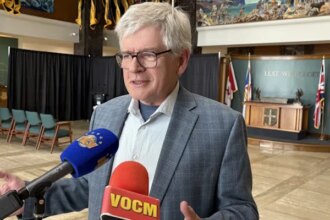In a strategic leadership transition that signals a new chapter for British Columbia’s energy landscape, BC Hydro announced the appointment of Christopher O’Riley as its new president and CEO on Wednesday. The timing of this executive change is particularly significant, coming just one day after the Crown utility unveiled its ambitious Power Action Plan designed to address the province’s growing electricity demands.
O’Riley, who brings extensive experience to the role having previously served as BC Hydro’s chief operating officer and interim president, steps into leadership at a pivotal moment. The province faces unprecedented energy challenges, with electricity demand projected to surge by up to 25 percent over the next decade—a growth rate that far outpaces previous forecasts.
“The appointment of Christopher O’Riley represents continuity and deep institutional knowledge at a time when BC Hydro is embarking on its most significant expansion since the 1980s,” said Energy Minister Josie Osborne in a statement released by the provincial government. “His familiarity with our operations and long-term vision makes him ideally positioned to implement our comprehensive energy strategy.”
The newly released Power Action Plan outlines an aggressive agenda that includes expanding electricity generation capacity, modernizing grid infrastructure, and accelerating the integration of renewable energy sources. This roadmap addresses the dual pressures of climate change initiatives and growing industrial demand, particularly from emerging sectors like artificial intelligence data centers and green hydrogen production.
O’Riley replaces outgoing president John Irving, who departs after guiding the utility through the initial phases of post-pandemic energy planning. The leadership change was approved by BC Hydro’s board of directors following an extensive executive search process that evaluated both internal and external candidates.
In his first public statement as president, O’Riley emphasized the scale of the challenge ahead: “British Columbia stands at an energy crossroads. The decisions we make over the next five years will shape our province’s economic competitiveness and environmental footprint for decades to come. We need to be bold, innovative, and fiscally responsible as we expand our capacity.”
The Power Action Plan represents BC Hydro’s most comprehensive infrastructure initiative in nearly four decades, with investment projections exceeding $36 billion over the next 20 years. Key components include the completion of the Site C dam project, expansion of transmission capacity to remote communities, and new partnerships with First Nations for clean energy development.
Energy analysts note that O’Riley faces significant challenges beyond simply increasing capacity. “The new president will need to balance competing priorities—maintaining affordable rates while funding massive infrastructure investments, addressing environmental concerns, and respecting Indigenous rights,” said Dr. Emma Patel, energy policy researcher at the University of British Columbia.
Rate increases remain a contentious issue. The BC Utilities Commission has already approved a 2.6 percent rate increase for 2024, with additional increases likely in coming years to fund the ambitious expansion plans. The utility has promised to implement cost-control measures to minimize the impact on consumers and businesses.
Opposition critics have questioned whether the leadership change and accelerated infrastructure plans are sufficient to address projected shortfalls. “The government has been caught flat-footed by the pace of electrification,” said Opposition energy critic Tom Williams. “Appointing a new president doesn’t solve the fundamental problem that we’re years behind in planning for our energy future.”
As British Columbia positions itself as a clean energy leader amid global decarbonization efforts, O’Riley’s leadership will prove crucial in determining whether the province can successfully navigate complex energy challenges while maintaining economic competitiveness. The success or failure of BC Hydro’s expansion strategy under his guidance will ultimately shape the province’s energy security for generations.
With demand growth accelerated by climate policies encouraging electrification across industries, can British Columbia’s ambitious power generation plans keep pace with its rapidly evolving energy needs?










